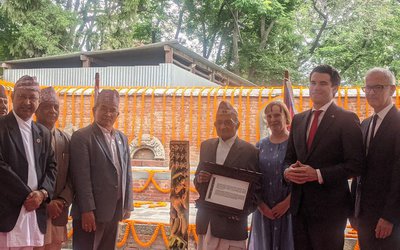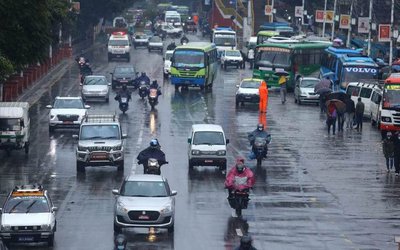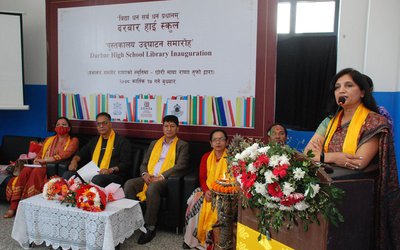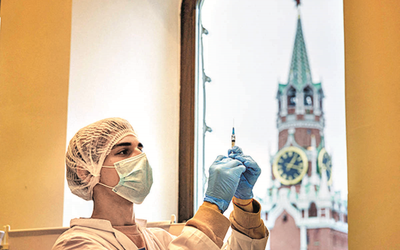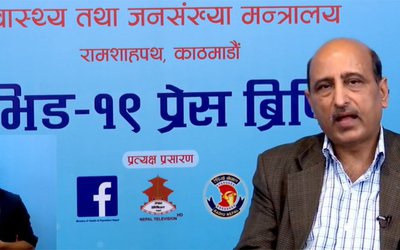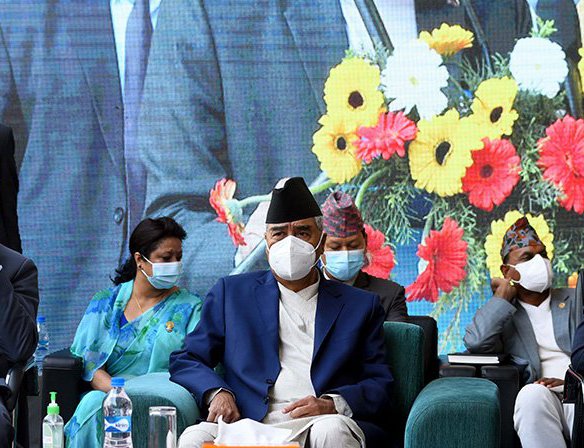
Prime Minister Sher Bahadur Deuba initiated the typhoid vaccination campaign amidst a function organised at the Durbar High School, Ranipokhari here today.
The vaccination campaign is to be rolled out throughout the country from tomorrow till May 1. The typhoid vaccination programme will also be included in the regular national immunization programme.
Under the programme children between the ages of one year three months to 15 years would be administered the vaccines against typhoid. On the occasion, Prime Minister Deuba expressed the confidence that like in controlling COVID-19 infection, the country will become successful in typhoid control programme as well.
He said around 7.5 million children between the age of one year three months to 15 years would be administered the vaccines against typhoid as part of the campaign.
The Ministry of Health and Population, Gavi, the Vaccine Alliance, UNICEF, WHO and other partners are collaborating on the nationwide typhoid vaccine introduction including a catch-up campaign, which seeks to vaccinate all children from the age of 15 months to 15 yearsto protect them from typhoidfever.
The campaign aims to reach95% coverageof nearly 7.5 million childrenwiththe typhoidconjugate vaccine (TCV)and simultaneously identify ‘zero-dose’children and those that have missed other routinevaccines.
Anuradha Gupta, Gavi’s Deputy CEO: “Congratulations to the Government of Nepal on this milestone; the introduction of the TCV will ensure the lives of thousands of children are protected across the country for years to come.”
With support from Gavi, the Vaccine Alliance, WHO, UNICEF and other partners, the Government of Nepal today launched a new vaccine campaign introducing Typhoid Conjugate Vaccine (TCV) into the routine immunisation programme across the country.
The three-week campaign, which will run from 8th April to 1st May 2022, aims to reach all children between 15 months and 15 years to quickly achieve wider protection from typhoid, increase the impact of the vaccine introduction and combat the rise of antimicrobial resistance. Over 50,000 vaccination sites have been established across rural and urban settings in the country, including schools. Immediately following the campaign, TCV will be introduced into the routine immunisation schedule, and will be regularly administered to children at 15 months of age.
“Congratulations to the Government of Nepal on this milestone; the introduction of the TCV will ensure the lives of thousands of children are protected across the country for years to come, as well as helping to combat the rise of antimicrobial resistance. This is also a great opportunity to leverage this introduction to identify and reach those children being missed by other life-saving vaccines and essential health services,” said Anuradha Gupta, Deputy Chief Executive Officer of Gavi, the Vaccine Alliance.
Nepal is a typhoid-endemic country and is estimated to have one of the highest burdens of typhoid in the world. The nationwide introduction means children in the country under the age of 15 years will now be able to access the vaccine free of charge.
“Vaccines are among the best investments we can make to give every child a healthy start in life,” said Elke Wisch, UNICEF Representative to Nepal. “The introduction of the Typhoid-Conjugate Vaccine into Nepal’s national immunization programme will save the lives of thousands of Nepali children and is critical to tackle the high burden of typhoid in children in the country. This expansion and further strengthening of routine vaccination services in Nepal is particularly timely in the wake of the COVID-19 pandemic, given the widespread impact it has had on regular health services.”
The TCV campaign will also strengthen and promote routine immunisation in Nepal by identifying children aged 15 to 23 months that have missed other routine vaccines, and make sure they are able to access these vaccines and become fully immunised and protected.Based on lessons learned during the successful Measles Rubella Campaign in 2020, the TCV campaign will also be used to identify zero-dose children - children who haven’t received a single dose of the basic diphtheria, tetanus and pertussis-containing vaccines (DTP) vaccine. Zero-dose children face multiple deprivations and are markers of acute inequities.
Children out of school will be identified through the Ministry of Education, Science and Technology and caregivers will be educated and informed about where to go for routine immunization through the support of local leadership and health workers. Good hygiene behavior will also be promoted throughout the campaign to help prevent the spread of the virus.
“The Typhoid Conjugate Vaccine is highly efficacious and its introduction in Nepal will significantly reduce the burden of typhoid disease among children in the country,“ said WHO Representative to Nepal, Dr Rajesh Sambhajirao Pandav. “Additionally, typhoid vaccination can slow the expansion of drug-resistant strains which is an emerging global health issue. Along with vaccination campaigns, Nepal mustalso strengthen surveillance for antimicrobial resistance, and work on improvement of sanitation and access to safe drinking water."
Nepal is the fourth country supported by Gavi to introduce TCV into its routine immunisation programme.Pakistan, Liberia and Zimbabwehave all introduced the vaccine, with support from Gavi and partners including UNICEF.
In addition to typhoid vaccination programs, other efforts to control the disease, including health education, water, sanitation, and hygiene (WASH) improvements, and training of health professionals in diagnosis and treatment should be encouraged and implemented in countries.
The Global Burden of Disease study estimated that in 2019, there were at least 82,449 typhoid cases and 919 typhoid deaths in Nepal.
Gavi, the Vaccine Alliance is a public-private partnership that helps vaccinate half the world’s children against some of the world’s deadliest diseases. Since its inception in 2000, Gavi has helped to immunise a whole generation – over 888 million children – and prevented more than 15 million future deaths, helping to halve child mortality in 73 lower-income countries. Gavi also plays a key role in improving global health security by supporting health systems as well as funding global stockpiles for Ebola, cholera, meningitis and yellow fever vaccines. After two decades of progress, Gavi is now focused on protecting the next generation and reaching the unvaccinated children still being left behind, employing innovative finance and the latest technology – from drones to biometrics – to save millions more lives, prevent outbreaks before they can spread and help countries on the road to self-sufficiency. Learn more at www.gavi.org and connect with us on Facebook and Twitter.
The Vaccine Alliance brings together developing country and donor governments, the World Health Organization, UNICEF, the World Bank, the vaccine industry, technical agencies, civil society, the Bill & Melinda Gates Foundation and other private sector partners. View the full list of donor governments and other leading organizations that fund Gavi’s work here.
About UNICEF
UNICEF works in some of the world’s toughest places, to reach the world’s most disadvantaged children. Across more than 190 countries and territories, we work for every child, everywhere, to build a better world for everyone. For more information about UNICEF and its work for children visit www.unicef.org
About WHO
The World Health Organization provides global leadership in public health within the United Nations system. Founded in 1948, WHO works with 194 Member States, across six regions and from more than 150 offices, to promote health, keep the world safe and serve the vulnerable. Our goal for 2019-2023 is to ensure that a billion more people have universal health coverage, to protect a billion more people from health emergencies, and provide a further billion people with better health and wellbeing.For updates on COVID-19 and public health advice to protect yourself from coronavirus, visit www.who.int and follow
- The Sentiment Of Monetary Policy Seems Focused On Increasing Eemand: FNCCI President Chandra Prasad Dhakal
- Jul 26, 2024
- Monetary Policy 081/82 Is Making The Economy More Dynamic: Governor Adhikari
- Jul 26, 2024
- Global IME Bank And Shashila Motors Signed Agreement Regarding Electric Vehicle loan
- Jul 26, 2024
- Lok Bahadur Thapa, permanent representative of the UN in New York, was appointed as the Vice President of ECOSOC
- Jul 26, 2024
- Leeladevi Gadtaula Became The First woman Chief Secretary
- Jul 26, 2024

